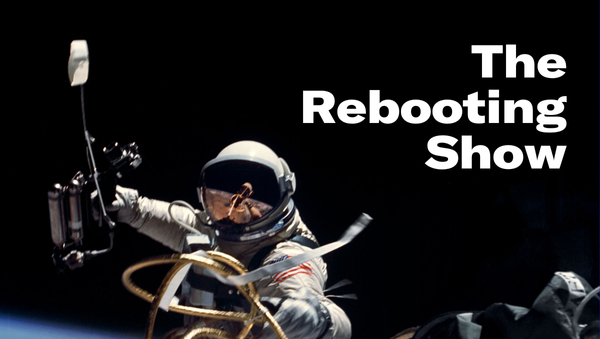Jake Sherman on Punchbowl’s $10m first year
“We felt like we had the playbook, so to speak.”
This week I’m continuing a run of discussions with people operating the publications that sit at the nexus of power and politics. Punchbowl has had a successful launch as one of the new crop of publishers. Check out the episode, and if you’re not already, please subscribe on Apple or Spotify. Also, please leave a rating and review if you use Apple.

Washington D.C. has long been a company town, only the company in question is the sprawling federal government, its various apparatuses – and those who influence them. It’s no surprise then that the once-sleepy media business around the government has become one of the most vibrant areas of growth in digital publishing. Consider:
- Axel Springer ponied up $1 billion to acquire Politico last August.
- Axios has pulled off one of the most successful early runs for a media company in its first five years, with a valuation of $430 million.
- The Hill was bought by Nexstar Media Group for $131 million last August.
- Grid News recently raised $10 million in venture funding.
Add in Punchbowl, a year-old media startup founded by Politico veterans. Jake Sherman, a co-founder of Punchbowl, wrote Politico's flagship newsletter, Playbook, along with fellow co-founder Anna Palmer. (John Bresnahan, the former Congressional bureau chief for Politico, is the third co-founder.)
While some digital media startups go to great pains to hang their differentiation on a new format or approach or business model, Punchbowl’’s model is fairly straightforward. It is going to out-report its competition and be a must-read for those who need to keep up with the ebb and flow of legislation on Capitol Hill. While many outlets wander to focus on the White House, Punchbowl is squarely focused on the legislative branch.
“We know we know the audience, we know what they're interested in, we understand the business model, we have ambitions,” said Sherman, speaking from his office at the Capitol during a week when the legislature was in recess. “We felt like we had the playbook, so to speak.”
So far, so good. Punchbowl reached $10 million in revenue in its first year, with $1 million coming from subscriptions and the rest from sponsorships bought by trade groups and companies looking to get their public affairs messaging in front of those making and influencing policy. That’s with a team of 10.
Jake and I discussed how Punchbowl differentiates by using the Capitol as its lens, how being entrenched alongside the audience helped, and why ads and subscriptions can work well together. (Answers have been edited and condensed for clarity.)
Focusing on the Capitol
As Trump and Biden have learned, the presidency’s powers are limited when it comes to passing legislation that reflects the president’s priorities. For Punchbowl, named after the Secret Service code name for the Capitol, the focus is on the legislative process, in particular the priorities of the leadership of both parties.
“I’ve long had the view that the presidency is overrated in terms of power as an institution. We see that right now. The Build Back Better Act, a massive piece of legislation, has completely stalled. It’s stalled because of Congress. Congress is the most important institution in America, and we are positively obsessed with how Congress works, and how everything moves through this building. The entire ecosystem of Washington – the lobbying world, the campaign world, billions and billions of dollars – exists to influence and to get this building to move or not move. It's as simple as that.”
The importance of context
Political journalism has long been a source of complaints. Most revolve around its dependence on access and tendency to focus on the “horse race” of politics instead of the merits of policy. Punchbowl makes no apologies for its focus on the sausage-making process of the Hill, while steering clear of minor gotcha controversies.
“If Mitch McConnell or Chuck Schumer goes out and says something that's a little bit different than he said the day before, that's incredibly important to our readership, and they need to understand that. We contextualize that for them, tell them why it's different and tell them what it means for them.”
“What the big players in Congress are doing helps tell a big story about our government, about our politics and about congressional politics and the politics of governing. That is important.”
Understanding the audience
New companies look for product-market fit. In publishing, that means having a deep understanding of the needs of the audience – and what the audience will value. Thanks to deep experience in Washington – the co-founders each have more than 15 years of experience covering politics – Punchbowl’s founders “were confident that we knew what the audience wanted because we live among the audience.”
“I'm in the Capitol. I spend 16 hours a day here. Our audience trusts us. That's something that I think is really important. People not only read us, people see us on the Hill, they see us at events. They feel like these are people who have good sources and we can trust. We felt like if we created the product that we knew we could create, then the money would follow.”
Ads aren’t bad
Too often, business models are treated as black or white. Many preach subscriptions as the only way for a modern publisher to align incentives properly. Yet most sustainable media businesses have multiple sources of revenue, including advertising. Punchbowl is no different, with nearly 90% of its $10 million in revenue in its first year coming from sponsorships of its newsletters or events. The rest came from a $300 a year subscription Punchbowl offers.
“We're taking ad revenue. We are trying to create a sustainable company that is very focused on power people in politics. If somebody had a $1 million-plus in subscription revenue on Substack, people would be like, look at that, that's amazing. We've created both a sustainable subscription business and a sustainable ad business. I'm very proud of that.”


Publishers often struggle to know which partners bring incremental value. And the complexity of programmatic advertising has only exacerbated the problem. Audigent has been focused on demand generation for publishers’ premium publisher data since day one, delivering customized solutions that drive additional direct and indirect revenue. Audigent’s platform is simple to integrate and focuses on a combination of technology, service and unique demand, providing a proven solution for what publishers need most today and into the cookieless future. White-glove service, superior technology and demand generation are three primary reasons why some of publishing’s most-recognizable and innovative brands rely on Audigent.

Things to check out
Insider is shutting down its Australian outpost. BI, like HuffPost and others, went on a rapid international expansion with a patchwork of licensing deals and a few operated outposts. International editions are difficult to make work, particularly having much impact through a licensing deal that sprinkles a couple local staff on top of the existing content.
As expected, Web3 is firmly in its trough of disillusionment. With the price of crypto far off its peaks last year, critics have come out in swarms. Casey Newton has a balanced take on how Web3 can deliver tangible progress on its many promises. Ideally, that will mean more shipping and fewer inscrutable tweeted koans.
Streaming has also hit a wall after years of giddy growth. It was inevitable that the explosion of streaming services – I still can’t get over Sundance Now existing – would lead to saturation and subscription fatigue. It’s one thing to bundle a free subscription for Verizon customers, it’s another to get those same people to pay full price. The question for the biggest players – Netflix, Disney, Warnermedia – is how to improve the economics of streaming without cutting the massive content budgets that attracted customers in the first place.
Platforms can’t have it both ways. I always fall on the side of free expression, but technology platforms blithely wave around the First Amendment when it doesn’t apply. The Bill of Rights doesn’t include the right to monetization. Spotify is struggling with its ties to Joe Rogan, who it signed to a $100 million deal. I think that’s appreciably different than someone on a platform spouting nonsense. Backing “creators” means you are assuming responsibility and tacitly endorsing the content produced. I’m leery of the current kneejerk to silence voices that people disagree with – that doesn’t have a great track record in the long run – but companies are responsible, legally and in the free market, for their business partners.

Thanks for reading. If you’re interested in sponsorship opportunities with The Rebooting, please check out my sponsorship kit. Please get in touch if you’d like to discuss how we can work together: bmorrissey@gmail.com




